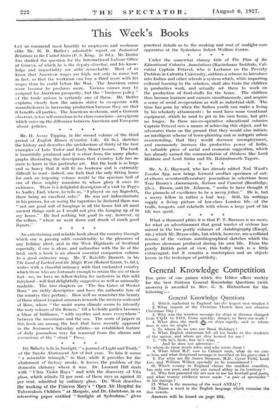This Week's Books
LET us commend most heartily to employers and workmen alike Mr. H. B. Butler's admirable report on Industrial Relations in the United States (P. S. King. 2s 6d.). Mr. Butler has studied the question for the International Labour Office at Geneva, of which he is the deputy-director, and his know- ledge and impartiality are alike remarkable. Most of us know that American wages are high, not only in name but in fact, so that the workman can buy a third more with his wages than lie could before the War. The American earns more because he produces more. Various causes may be assigned for American prosperity, but the " business policy " of the trade unions is certainly one of them. Mr. Butler explains clearly how the unions strive to co-operate with manufacturers in increasing production because they see that it benefits all parties. The American workman, said a German observer, is too self-conscious to be class-conscious—an epigram which sums up the difference between American and European
abour policies. * * * *






































 Previous page
Previous page